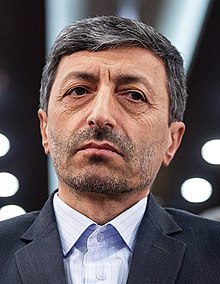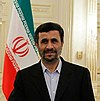Parviz Fattah
Parviz Fattah | |
|---|---|
 | |
| Head of the Execution of Imam Khomeini's Order | |
| Assumed office 29 October 2023 | |
| Appointed by | Ali Khamenei |
| Preceded by | Mohammad MokhberAref Norouzi (acting) |
| Head of the Mostazafan Foundation | |
| In office 22 July 2019 – 29 October 2023 | |
| Appointed by | Ali Khamenei |
| Preceded by | Mohammad Saeedikia |
| Succeeded by | Hossein Dehghan |
| Head of the Imam Khomeini Relief Foundation | |
| In office 5 April 2015 – 21 July 2019 | |
| Appointed by | Ali Khamenei |
| Preceded by | Hossein Anvari |
| Succeeded by | Morteza Bakhtiari |
| Minister of Energy | |
| In office 24 August 2005 – 3 September 2009 | |
| President | Mahmoud Ahmadinejad |
| Preceded by | Habibollah Bitaraf |
| Succeeded by | Majid Namjoo |
| Personal details | |
| Born | Parviz Fattah Gharabaghi c. 1961 (age 62–63) Qarah Bagh, Urmia, Iran |
| Political party | Front of Islamic Revolution Stability[1] |
| Children | 2[2] |
| Alma mater | Sharif University of Technology Amirkabir University of Technology Imam Hussein University[3] |
| Signature |  |
| Military service | |
| Allegiance | |
| Branch/service | Revolutionary Guards |
| Years of service | 1980–2005; 2009–2015 |
| Unit | Khatam-al Anbiya Headquarters |
| Commands | Cooperation Bonyad |
| Battles/wars | Iran–Iraq War |
Sayyid Parviz Fattah (Persian: سید پرویز فتاح) is an Iranian conservative politician and former member of the Revolutionary Guard. He has been head of the Execution of Imam Khomeini's Order since 2023.
He was minister of energy in Mahmoud Ahmadinejad's first cabinet from 2005 to 2009. He was head of the Imam Khomeini Relief Foundation from 2015 to 2019 and head of the Mostazafan Foundation from 2019 to 2023.[4]
Early life and education
[edit]Born in Urmia in 1961, he has the license of civil engineering from Sharif University of Technology, a master's degree in systems engineering from Amirkabir University of Technology in Tehran and PhD from Imam Hossein University in Tehran.
Career
[edit]Fattah was appointed energy minister in 2005 and approved by the Majlis with 194 votes in favor.[5] He was in office until 2009. He then became the executive director of Bonyad Taavon Sepah, which is the IRGC's cooperative foundation.[6] He was also named deputy commander of the IRGC's construction body, Khatam ol Anbia.[7]
Sanctions
[edit]The US Treasury Department put sanctions on Fattah in December 2010 due to his activities in the Bonyad Taavon Sepah that provides services to the IRGC.[6] He was also sanctioned by the U.S. Treasury in November 2020 for his connections to Supreme Leader Ali Khamenei. [6]
References
[edit]- ^ "Iran political parties prepare for presidential elections", Iran's View, 7 March 2013, archived from the original on 20 April 2017, retrieved 11 April 2017
- ^ زندگینامه: سید پرویز فتاح (۱۳۴۰- )
- ^ Alfoneh, Ali (May 2008). "Ahmadinejad versus the Technocrats" (PDF). Middle East Outlook. 4: 1–9. Archived from the original (PDF) on 11 November 2013. Retrieved 18 February 2013.
- ^ "انتصاب اعضای هیأت امنا و رئیس کمیته امداد امام خمینی(ره)".
- ^ "Iran: 17 proposed ministers receive votes of confidence, 4 rejected". Payvand. 25 August 2005. Archived from the original on 17 November 2022. Retrieved 1 July 2013.
- ^ a b c "Fact Sheet: Treasury Designates Iranian Entities Tied to the IRGC and IRISL" (Press release). US Treasury Department. 21 December 2010. Retrieved 29 July 2013.
- ^ Erdbrink, Thomas (10 January 2010). "Elite force's growing role in Iran may limit U.S. options". The Washington Post. Tehran. Archived from the original on 11 November 2013. Retrieved 29 July 2013.
- 1961 births
- Living people
- People from Urmia
- Government ministers of Iran
- Imam Hossein University alumni
- Amirkabir University of Technology alumni
- Sharif University of Technology alumni
- Iranian civil engineers
- Front of Islamic Revolution Stability politicians
- Islamic Revolutionary Guard Corps officers
- Iranian individuals subject to U.S. Department of the Treasury sanctions
- Iranian politician stubs


